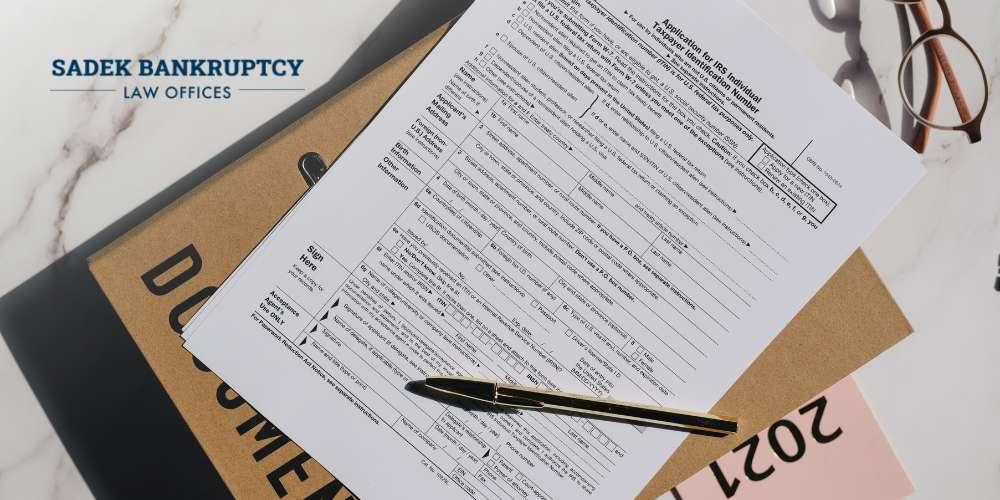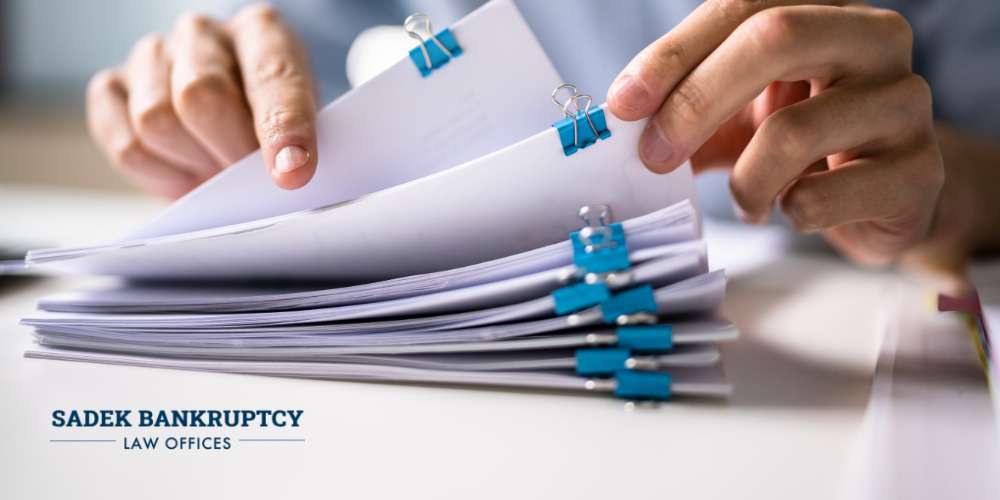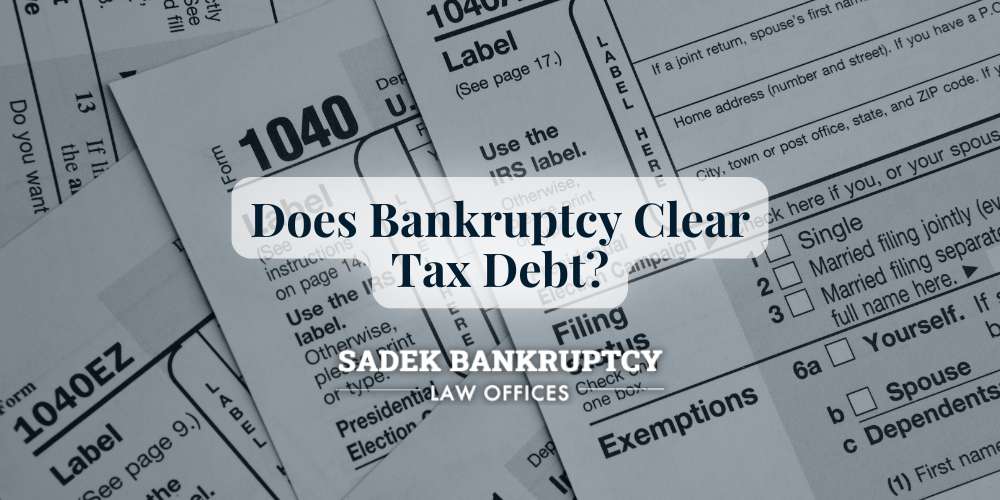While owing debts can be stressful even under the best conditions, it can be all the more fraught when the government agencies pursue you for tax debts. Bankruptcy is known for providing financial relief to those struggling with debt, but does bankruptcy clear tax debt?
If you are struggling with old tax debt, don’t hesitate to call the Sadek Bankruptcy Law Offices. Managing tax debt can be difficult, especially when you don’t know all your options. Our New Jersey and Pennsylvania bankruptcy lawyers can help you understand options for addressing tax debts, including bankruptcy and more. Filing for bankruptcy can discharge tax debt. However, only certain tax debts are dischargeable through bankruptcy.
Ready to learn more about how bankruptcy can help with your debts? Call the Sadek legal team’s Pennsylvania office at (215) 545-0008 today. New Jersey clients can reach us by calling (856) 890-9003.
Does Filing Bankruptcy Clear Tax Debt?
Bankruptcy can clear certain income tax debts. However, the Internal Revenue Service (IRS) imposes strict requirements for those seeking to discharge tax obligations. Whether or not you qualify to discharge tax debts depends on the age of the debt, the type of tax debt, and whether you have filed tax returns and done so on time.
What Tax Debt Can Bankruptcy Discharge?
Bankruptcy can only clear one type of tax debt: state and federal income taxes. Other tax liabilities cannot be discharged through bankruptcy, including property taxes, trust fund taxes, payroll taxes, and tax penalties.

How Chapter 7 and Chapter 13 Affect Tax Debts
If you owe tax debt to the state or federal government, bankruptcy can offer you certain protections as you seek debt relief. For example, the court will issue an automatic stay as soon as you file your bankruptcy petition.
This legal protection stops creditors, including the IRS, from continuing to contact you or collect on debts while your bankruptcy case remains open. The automatic stay prevents wage garnishment, bank account freezes, and new federal tax liens. It can also halt NJ and PA tax foreclosure, repossession, and creditor harassment.
How bankruptcy helps you relieve tax debts depends on the type of bankruptcy filed. Individuals seeking financial assistance most often file either Chapter 7 bankruptcy or Chapter 13 bankruptcy. The Pennsylvania and New Jersey bankruptcy attorneys at the Sadek Bankruptcy Law Offices can help you determine which type of bankruptcy will work best for your financial situation.
Can IRS Debt Be Discharged in Chapter 7?
Yes, Chapter 7 bankruptcy can discharge federal income tax debt. Also known as liquidation bankruptcy, Chapter 7 bankruptcy is often used to discharge unsecured debts such as credit card debt and medical bills. This type of bankruptcy allows you to repay your debts by liquidating certain assets.
After selling your assets, a bankruptcy trustee will distribute the proceeds among your creditors. Any remaining dischargeable debts, including dischargeable taxes, will be dismissed.
If you have questions about Chapter 7 bankruptcy, call The Sadek Bankruptcy Law Offices. Our NJ and PA Chapter 7 bankruptcy lawyers can help you figure out if you qualify for Chapter 7, which state or federal property exemptions apply to your case, and much more.
Can You Include Tax Debt in Chapter 13?
Yes, you can include income tax debts in your Chapter 13 bankruptcy. This type of bankruptcy restructures your debts to make paying creditors easier. Debtors make monthly payments towards a new repayment plan for a period of 3 to 5 years.
Some debtors prefer Chapter 13 because it offers certain benefits not available under Chapter 7 bankruptcy. Debtors do not have to liquidate assets to pay off debts under Chapter 13 bankruptcy. Additionally, Chapter 13 bankruptcy offers tax deductions for filers in PA.
Chapter 13 bankruptcy prioritizes repayment of certain kinds of debts over others. A greater portion of your monthly payments will go towards prioritized debts. Priority tax debts, such as your most recent income taxes or taxes that do not otherwise qualify for discharge, must be paid in full through your Chapter 13 repayment plan. However, you may wind up paying less than the full amount owed for non-priority tax debts.
Not sure if Chapter 13 is the best choice for you? Sadek Law’s Chapter 13 bankruptcy attorneys in New Jersey and Pennsylvania can offer insight into the bankruptcy process. After carefully reviewing your case, we’ll help you consider bankruptcy and other alternatives for discharging tax debts.

When is Income Tax Debt Not Dischargeable in Bankruptcy?
Although bankruptcy can discharge income tax debt, not all income tax debt qualifies for discharge. Bankruptcy cannot discharge income tax debt that is less than three years old. In both Pennsylvania and New Jersey, the tax debt must be related to a tax return you filed at least two years before filing for bankruptcy. If the tax debt is not old enough, if you did not file a tax return for the debt in question, or if you did not file on time, your debt may not qualify for discharge.
Debt assessment also plays an important role in discharging tax debts through bankruptcy. For a debt to qualify for discharge, the IRS must have assessed the debt within the last 240 days. Bankruptcy cannot discharge tax debts that either have not been assessed at all or that were assessed more than 240 days ago.
The IRS does not allow those who have committed tax fraud to discharge debts through bankruptcy. Submitting fraudulent returns, avoiding payments, underreporting your income, and other fraudulent activity will prevent tax debt discharge.
Bankruptcy cannot discharge IRS tax liens. If the IRS has already placed a tax lien on your property, you will have to pay it off. However, filing for bankruptcy can prevent the IRS from initiating new tax liens.
Understanding bankruptcy and IRS debt can be difficult, which is why it’s important to talk to an experienced lawyer regarding your situation. Rather than figuring out these complex matters on your own, rely on the substantial legal knowledge of Sadek Law’s bankruptcy attorneys.
How Bankruptcy Will Affect Future Tax Filings
Before filing for bankruptcy, you should fully understand how bankruptcy can impact your life. This includes how bankruptcy can affect filing future tax returns. The legal team at Sadek Law can answer questions so you can make informed decisions about filing for bankruptcy.
For example, you may wonder if bankruptcy payments are tax-deductible. The answer depends on which type of bankruptcy you file and your reason for filing bankruptcy. For example, Chapter 13 bankruptcy payments usually do not qualify as tax deductions. However, repaying mortgage interest under a Chapter 13 payment plan is a tax-deductible expense.
Bankruptcy can also affect your tax return paperwork. If bankruptcy clears your debts, you might need to include a Cancellation of Debt form with your next tax return. Some forms of debt forgiveness or cancellation qualify as taxable income, thus affecting your tax liability. However, there is an income tax advantage in personal bankruptcy. Unlike some other types of debt cancellations, the IRS typically does not consider debts discharged through bankruptcy as taxable income.
Will I Lose My Tax Refund if I File Chapter 7 or Chapter 13?
Another question clients often ask us is, “Can I keep my tax return in bankruptcy?”
Since Chapter 7 bankruptcy involves liquidating property to pay off debts, any nonexempt property becomes part of the bankruptcy estate. This can include a tax refund from the year before you filed for bankruptcy. However, your trustee can only ask you to turn over your tax refund once during your Chapter 7 bankruptcy case. Future refunds are not subject to liquidation. On the other hand, future tax refunds can be affected by Chapter 13 bankruptcy. Your trustee can keep refunds for every year of the payment plan.
An experienced bankruptcy attorney may be able to help you avoid losing your tax refund to bankruptcy. For example, the Sadek legal team can offset your anticipated tax return with expenses you have throughout the year.

Alternative Solutions to Tax Debt
If you would rather avoid filing for bankruptcy, or if your tax debts do not yet qualify for discharge, there are alternative options to settling your tax debts. Depending on the amount you owe, you may benefit from setting up a payment plan with the IRS or the state government. Debtors with less than $50,000 in debt who need more than 180 days to pay can set up a formal installment agreement with the IRS. If you have a federal tax debt under $100,000 and can pay in full within 180 days, you can set up a payment plan without a formal installment agreement.
The IRS also offers options for those who can’t afford full monthly payments and those who cannot pay off their debt in full. A partial payment installment agreement can lower your monthly payments. The IRS will review your finances every two years. Your payments may increase as your income increases.
More rarely, the IRS sometimes agrees to an offer in compromise to settle federal tax debts for less than the full amount owed. The IRS typically only accepts an offer in compromise if you legitimately cannot afford to pay your full tax liability within a reasonable amount of time or if doing so would create significant financial hardship.
When to Hire a Bankruptcy Lawyer for Tax Debt
The stress that often comes with financial problems doesn’t make it any easier to make important decisions regarding your tax debts. Those who are already struggling with their finances understandably want to save money however they can.
You may even ask yourself, “Should I negotiate with the IRS myself or hire a tax attorney?” Although you may be tempted to avoid the legal costs associated with seeking help from an attorney, it will ultimately be more beneficial to seek professional legal help. The moment you begin considering bankruptcy, you should consult with a bankruptcy attorney.
Tax debts are taken seriously by both the state and federal government. Failing to pay your debts can result in serious consequences, such as tax penalties that increase the amount you owe or a tax lien that could result in you losing valuable property. Additionally, bankruptcy is a complicated process that involves meeting strict requirements and filing out detailed paperwork. Making mistakes when filing for bankruptcy will cost you time and money and potentially cause more stress than you need.
An experienced bankruptcy lawyer can make the process of filing for bankruptcy go much smoother than it would on your own. The legal team at Sadek Bankruptcy Law Offices can provide crucial support throughout every step of bankruptcy proceedings. We’ll be by your side from figuring out if your tax debts qualify for discharge under the US Bankruptcy Code to representing you in bankruptcy court. We also ease the financial aspect of seeking legal help by offering free case evaluations and payment plans.

Bankruptcy Tax Debt FAQ
Can You File Bankruptcy on Back Taxes?
Can you file bankruptcy on back taxes in Pennsylvania or New Jersey? If your back taxes are income taxes, the debt may qualify for discharge through bankruptcy. Other types of back taxes cannot be discharged through bankruptcy.
Can You File Bankruptcy on Income Taxes?
Yes, you can file bankruptcy on income taxes that meet specific qualifications. This includes income tax debts older than 3 years that are associated with a tax return filed at least two years ago. To learn more about income tax debts that qualify for discharge through bankruptcy, contact a bankruptcy attorney.
Are Payroll Taxes Dischargeable in Bankruptcy?
No, payroll taxes are not dischargeable in bankruptcy. Bankruptcy can only discharge qualifying income tax debts.

Burdened by Tax Debts? Call the PA & NJ Bankruptcy Lawyers at Sadek Bankruptcy Law Offices Today
Take the first step towards taking control of your finances by contacting lead attorney Brad J. Sadek and the legal team at Sadek Bankruptcy Law Offices. We offer each client personalized services, carefully considering your unique situation before moving forward with a plan for debt relief. We have convenient office locations in both Pennsylvania and New Jersey, making it easier for clients to access the legal services they need.
The sooner you call, the sooner we can help you access financial relief. Contact us online to schedule your free consultation or call (215) 545-0008 to reach our Pennsylvania attorneys. For legal assistance in New Jersey, call (856) 890-9003.





